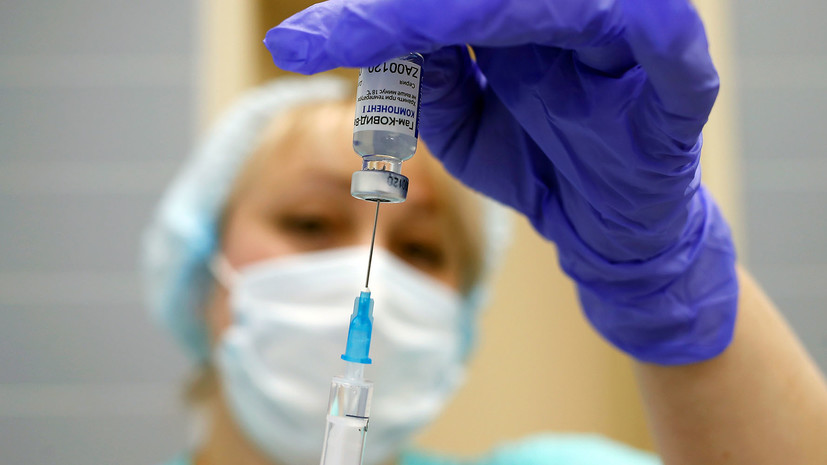Competition has become the reason for the negative perception of the Russian Sputnik V vaccine in the West, said Dmitry Peskov, press secretary of the Russian President.
“The fact that the Gamaleya Institute was able to use early developments in order to quickly come up with this decision on Sputnik V, of course, posed a threat from the point of view of competition for the largest manufacturers.
In short, everything is very simple: this is competition, not always fair, ”Peskov noted.
He also added that Russia "in general in the West is not in fashion."
“Not because it is bad, but because it becomes too good.
All this is competition, ”added Peskov.
Earlier, at all stages of the development process of a Russian vaccine against coronavirus, many Western media tried to question its effectiveness and reliability.
Since the end of summer 2020, publications such as The New York Times, Science Mag, Nature, CNN have regularly issued informational materials in which they questioned the effectiveness of the vaccine.
In addition, many publications continue to criticize any steps to promote Sputnik V.
For example, the American newspaper The Washington Post stated that the official Twitter of the vaccine was allegedly used to undermine the credibility of Western vaccines.
The material claims that Sputnik V allegedly uses the methods of “Russian propaganda”.
An example is the repost on Twitter of the Russian vaccine of the news of the American television channel CNBC that US citizens will not be able to demand compensation from the pharmaceutical companies Pfizer and Moderna if their vaccines have unwanted side effects.
At the same time, the next message from the Twitter account of Sputnik V asked how the Western media would react if the Russian drug caused "severe allergic reactions or caused four cases of facial paralysis on the injection side."
It was about an incident that occurred during the third phase of the Pfizer vaccine trial, when the US Food and Drug Administration identified four cases of so-called Bell's palsy in subjects.
Despite the fact that this data was provided by American regulators and information about such cases was replicated by the American media, The Washigton Post cites this as an example of how Sputnik V allegedly undermines the credibility of its Western competitors.
"Extraordinary circumstance"
Western media continued to attack the Russian drug itself after it began arriving at vaccination centers.
For example, the Associated Press news agency published a material claiming that in other countries Sputnik V was allegedly received with less enthusiasm than its Western counterparts.
An example was the lack of queues at clinics from those wishing to be vaccinated, as well as skepticism about the vaccine due to the fact that it was allegedly brought to the market too quickly.
In turn, the Bloomberg agency, as an example of why the Russian vaccine should not be trusted, cited the words of Vladimir Putin that he had not yet been vaccinated.
Recall that during the annual press conference, the President of the Russian Federation recalled that the coronavirus vaccine "has not yet reached his age group," but he will definitely be vaccinated "as soon as possible."
At the same time, Vladimir Putin called the drug "Sputnik V" safe and effective.
According to Vladimir Shapovalov, deputy director of the Institute of History and Politics at Moscow State Pedagogical University, there are several factors in the situation with the campaign against the Russian vaccine, and first of all it is economic and geopolitical competition, which leads to an irrational negative reaction from the West towards Sputnik V.
“In a massive pandemic that has become the most serious challenge for humanity in recent decades, the creation of a vaccine is akin to competition in space or the development of nuclear weapons.
In this sense, the West viewed the invention of a vaccine by Russia as an extraordinary circumstance, a serious moment of competitive advantage, which must be discredited by all means, "the political scientist explained.
In the current situation, the distribution of the vaccine is actually a redistribution of the world market, which implies a great economic benefit, since all countries of the world will vaccinate their population to one degree or another, he recalled.
“For the West, the availability of the Russian vaccine, which Moscow is ready to sell at a price significantly inferior to the cost of foreign vaccines, is a serious blow to the dividends that Europe and the United States intended to receive from the sale of their own drugs,” Shapovalov stressed.
In a conversation with RT, Andrei Suzdaltsev, deputy dean of the Faculty of World Economy and International Affairs at the Higher School of Economics, stressed that in today's realities, the COVID-19 vaccine, along with oil, gas, and weapons, is becoming a "political commodity", since the epidemic has affected millions of people.
"The Western media call the promotion of the Russian vaccine a political maneuver, because they want to promote their own developments," the political scientist emphasized.
Andrei Suzdaltsev also suggested that Western countries and local media may continue their discrediting campaign after large-scale vaccination begins in Russia.
"Subsequently, the West will deny the effectiveness of the Russian vaccine, question it, and will go for any fakes for this," Suzdaltsev predicted.

